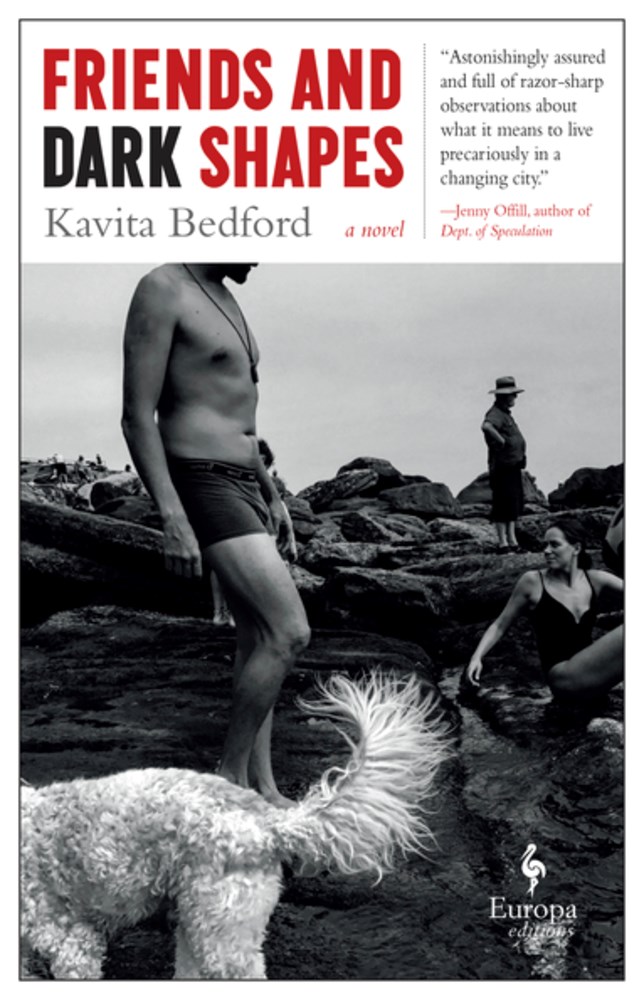
In her new book Friends and Dark Shapes, Australian-Indian writer Kavita Bedford explores a topic that few talk about: the limbo of being a single twenty-something with no permanent career prospects or domestic comforts in sight. In the wake of her father’s death, the nameless narrator is lost trying to create some sense of purpose from the impermanent shapelessness of shared housing. Over the course of four parts, with each part representing one season of their year together, she and her roommates grapple with day-to-day life, from the mundane (should we pitch in together to buy toilet paper in bulk?) to the existential (is the ugliness of city life worth its corresponding beauty?)– each question is seemingly approached with the weight brought on by new independence and the realization that decisions suddenly have much greater consequences.
The four roommates make up a hodge-podged makeshift family, doing their best to serve as a support system while walking the tender line of maintaining personal boundaries. They commemorate holidays, cast judgment on each other’s dating lives, and support each other through sadness in a careful tug-of-war between their desires for individuality and their need for human connection. It was impossible not to relate with Bedford’s vivid portraits of the four roommates, and in particular the protagonist. Each chapter spurred personal flashbacks to my years of living with roommates: the struggle to cooperatively maintain the space, the impromptu communal meals, the transient moments of vulnerability and tears, and, of course, the late night silliness that verges on the absurd.
Underlying this carefully woven story of the impersonally intimate relationship between roommates is an examination of racism in Australia. Once again I found myself in the narrator’s shoes as she tried to reconcile her own identity as the biracial daughter of an Indian immigrant with the casual racism towards the flow of refugees from abroad. Though she recognizes the injustice, the conflict exists purely in her mind and never seems to take steps towards change, a state of dissonance that I imagine many of us face in the US as well. Notably, she highlights the differences between racism in the US and Australia:
Often there is no vocabulary to even begin to discuss the language of race in [Australia]… At least in the States, they are so hyper-aware of colour, and race, and maybe it is out of control and politically incorrect, but at least you are allowed to say it aloud and it’s recognised.
Though neither situation is remotely ideal, Bedford does highlight the blessing that open discussion is even when it may sometimes end in hostility. Building on her analysis of Australia’s cultural differences to other anglicized cultures, she creates a persona of Sydney as indifferent, which bleeds into the comfortable, idleness of her characters.
Perhaps Bedford meant this as a specific criticism of Sydney, but it is also surely an attribute of the feeling of placelessness that we all feel as young adults. With the security of childhood homes stolen away and exposure to new “adult” views of places once held dear, surely we all end up with a feeling that something is off-kilter and that we suddenly no longer quite belong.
I found Friends and Dark Shapes to be incredibly well-written, an assortment of vignettes that feels like reading a private journal. The narrations are filled with snippet-like insights into the lives of her friends, roommates, coworkers, neighbors, or whoever she happened to encounter that day. As I was reading, I pulled many quotes from the book, finding myself relating to the characters on a variety of topics from their feelings of helplessness towards immigration to their feelings of dissonance relating to city life. As a twenty-something myself, I reveled in how relatable the book is, but at the same time, it lacked wow-factor for me instead feeling more like an intimate conversation with a friend that has stretched late into the night. As a lover of language, I tend to be swept away by gorgeous prose and sweeping narratives–Friends and Dark Shapes is certainly not that, but I think it’s something much truer to reality and truer to the experience of young adults today. This is truly a book for all the twenty or thirty-somethings grappling with city life and for all who were once in their shoes.
Thank you to Edelweiss+ by Above the Treeline and Europa Editions for an ARC in exchange for an honest review.
